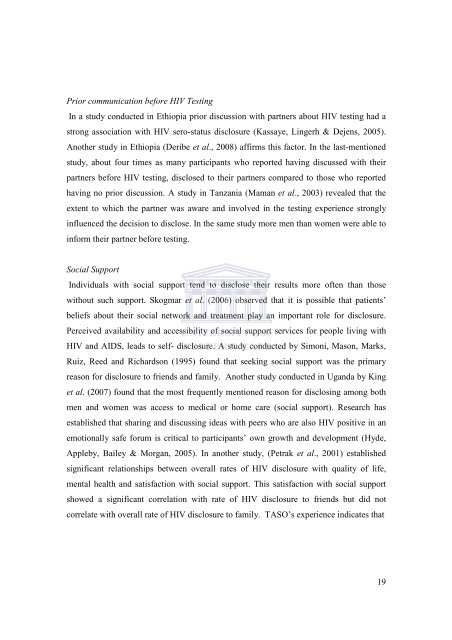Disclosure of Hiv status to sexual partners among people who ...
Disclosure of Hiv status to sexual partners among people who ...
Disclosure of Hiv status to sexual partners among people who ...
You also want an ePaper? Increase the reach of your titles
YUMPU automatically turns print PDFs into web optimized ePapers that Google loves.
Prior communication before HIV Testing<br />
In a study conducted in Ethiopia prior discussion with <strong>partners</strong> about HIV testing had a<br />
strong association with HIV sero-<strong>status</strong> disclosure (Kassaye, Lingerh & Dejens, 2005).<br />
Another study in Ethiopia (Deribe et al., 2008) affirms this fac<strong>to</strong>r. In the last-mentioned<br />
study, about four times as many participants <strong>who</strong> reported having discussed with their<br />
<strong>partners</strong> before HIV testing, disclosed <strong>to</strong> their <strong>partners</strong> compared <strong>to</strong> those <strong>who</strong> reported<br />
having no prior discussion. A study in Tanzania (Maman et al., 2003) revealed that the<br />
extent <strong>to</strong> which the partner was aware and involved in the testing experience strongly<br />
influenced the decision <strong>to</strong> disclose. In the same study more men than women were able <strong>to</strong><br />
inform their partner before testing.<br />
Social Support<br />
Individuals with social support tend <strong>to</strong> disclose their results more <strong>of</strong>ten than those<br />
without such support. Skogmar et al. (2006) observed that it is possible that patients’<br />
beliefs about their social network and treatment play an important role for disclosure.<br />
Perceived availability and accessibility <strong>of</strong> social support services for <strong>people</strong> living with<br />
HIV and AIDS, leads <strong>to</strong> self- disclosure. A study conducted by Simoni, Mason, Marks,<br />
Ruiz, Reed and Richardson (1995) found that seeking social support was the primary<br />
reason for disclosure <strong>to</strong> friends and family. Another study conducted in Uganda by King<br />
et al. (2007) found that the most frequently mentioned reason for disclosing <strong>among</strong> both<br />
men and women was access <strong>to</strong> medical or home care (social support). Research has<br />
established that sharing and discussing ideas with peers <strong>who</strong> are also HIV positive in an<br />
emotionally safe forum is critical <strong>to</strong> participants’ own growth and development (Hyde,<br />
Appleby, Bailey & Morgan, 2005). In another study, (Petrak et al., 2001) established<br />
significant relationships between overall rates <strong>of</strong> HIV disclosure with quality <strong>of</strong> life,<br />
mental health and satisfaction with social support. This satisfaction with social support<br />
showed a significant correlation with rate <strong>of</strong> HIV disclosure <strong>to</strong> friends but did not<br />
correlate with overall rate <strong>of</strong> HIV disclosure <strong>to</strong> family. TASO’s experience indicates that<br />
19
















